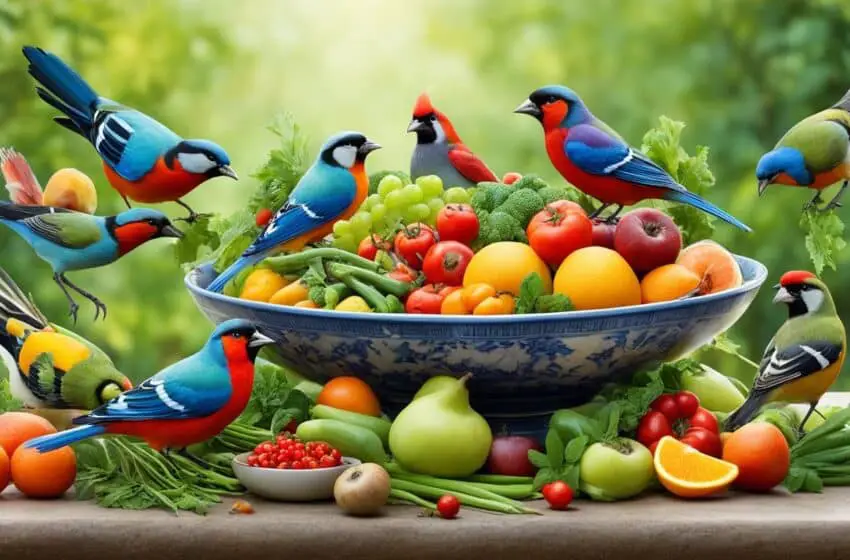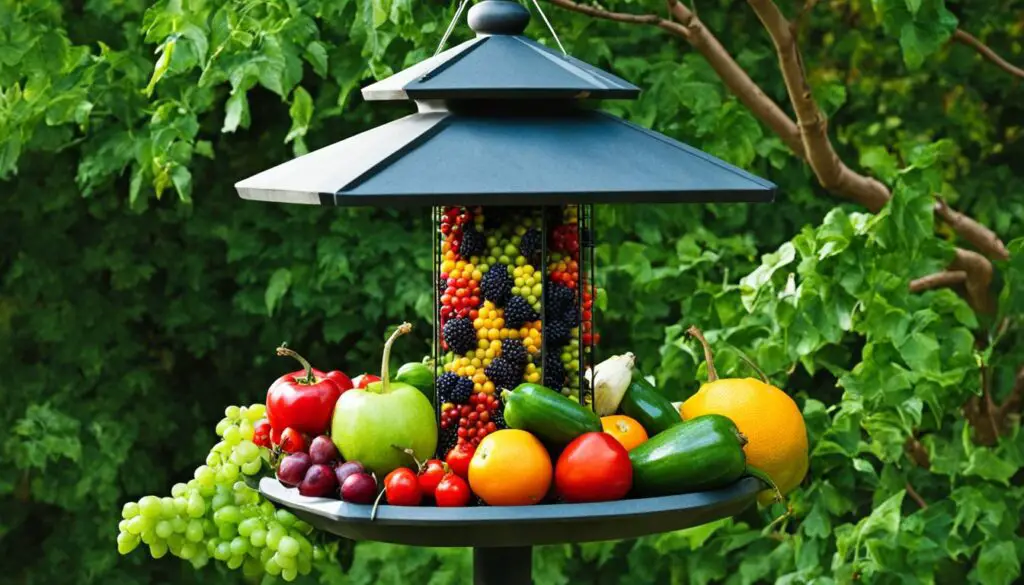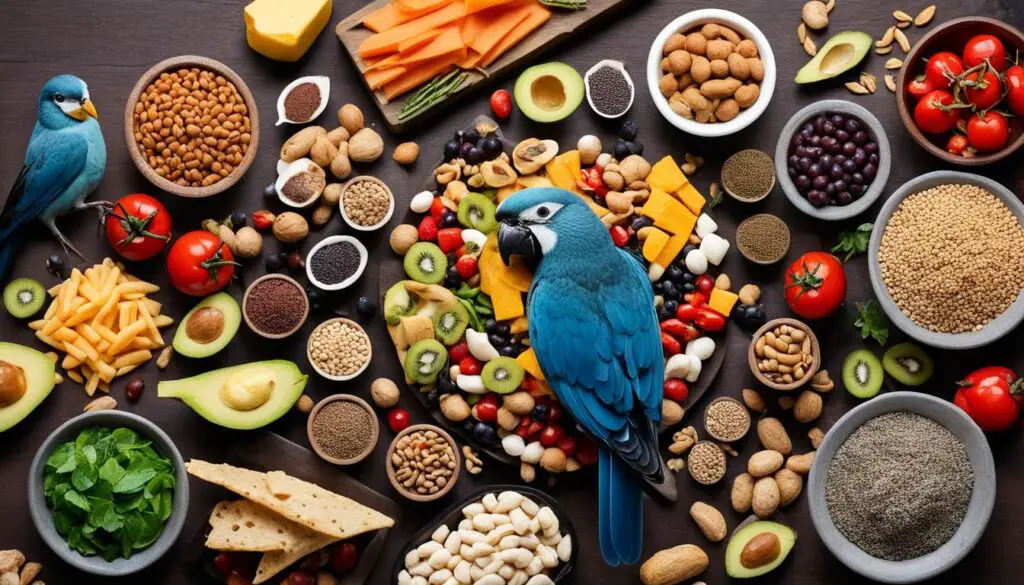Nutrition Advice for Small Pet Birds

I am excited to share with you some valuable nutrition advice to ensure your small pet birds lead a vibrant and healthy life. Proper nutrition is essential for the well-being of our feathered companions, and by understanding their dietary needs, providing fresh foods, and avoiding harmful foods, we can help them thrive.
Small pet birds have specific dietary needs that must be met to maintain optimal health. Their diet should consist of a combination of high-quality bird pellets, fresh fruits and vegetables, seeds, and occasionally, small amounts of protein-rich foods. Providing a varied diet is key to ensuring they receive all the necessary nutrients for their well-being.
Key Takeaways:
- Proper nutrition is crucial for the health of small pet birds
- Small pet birds require a combination of bird pellets, fresh fruits and vegetables, seeds, and protein-rich foods
- Fresh foods such as fruits and vegetables provide essential nutrients for small pet birds
- Avoid feeding small pet birds harmful foods like chocolate, avocado, caffeine, alcohol, and sugary or salty foods
- Ensure small pet birds have access to fresh and clean water at all times
Understanding the Dietary Needs of Small Pet Birds
Small pet birds have specific dietary needs that must be met to maintain optimal health.
When it comes to feeding small pet birds, it’s important to provide a well-rounded diet that meets all their nutritional requirements. Here are some key components of a healthy bird diet:
- Bird Pellets: High-quality bird pellets are a staple food for small pet birds. These pellets are specifically formulated to provide a balanced diet and contain essential vitamins, minerals, and nutrients that support their overall well-being.
- Fresh Fruits and Vegetables: Incorporating fresh fruits and vegetables into their diet is crucial for small pet birds. These provide important vitamins, antioxidants, and dietary fibers. Some recommended options include apples, carrots, spinach, and broccoli. Remember to wash and cut these foods into small, bird-sized pieces before offering them to your feathered friend.
- Seeds: Seeds are a natural part of a bird’s diet and can be included in moderation. However, they should not be the primary source of nutrition as they are high in fat. Opt for a seed mix specifically formulated for small pet birds to ensure a balanced intake.
- Protein-Rich Foods: Small amounts of protein-rich foods such as cooked eggs, lean meats, or insects can be given as occasional treats. These provide essential amino acids that promote muscle development and overall health.
It’s important to note that the dietary needs of small pet birds may vary depending on their species, age, and health condition. Consulting with a veterinarian who specializes in avian care can provide personalized guidance and recommendations tailored to your bird’s specific dietary needs.
“A varied diet that includes high-quality bird pellets, fresh fruits and vegetables, seeds, and occasional protein-rich foods is key to meeting the dietary needs of small pet birds and promoting their optimal health.” – Dr. Jane Peterson, Avian Specialist
Sample Diet Plan for Small Pet Birds:
| Meal | Food |
|---|---|
| Morning | Bird pellets |
| Afternoon | Assorted fresh fruits and vegetables (e.g., apples, carrots, spinach) |
| Evening | Seed mix |
| Occasional Treats | Small amounts of cooked eggs, lean meats, or insects |
Remember to provide fresh and clean water at all times, and ensure the water container is easily accessible and shallow enough for your bird to drink comfortably.
By understanding and meeting the dietary needs of small pet birds, you can contribute to their overall health, vitality, and longevity.
Importance of Fresh Foods in a Bird’s Diet
Fresh foods, such as fruits and vegetables, play a crucial role in a bird’s diet. These provide essential vitamins, minerals, and antioxidants, which are vital for their overall health. Incorporating fresh foods into your bird’s diet can help boost their immune system, support healthy growth, and contribute to their overall well-being.
When it comes to choosing fresh foods for your small pet bird, it is important to select options that are safe and nutritious. Some fruits and vegetables that are suitable for small pet birds include:
- Apples
- Carrots
- Spinach
- Broccoli
Remember to wash these foods thoroughly and cut them into small, bird-sized pieces before offering them to your feathered friend. Providing a variety of fresh fruits and vegetables ensures that your bird receives a range of essential nutrients.
Here’s a table showcasing the nutritional benefits of some common fresh foods for small pet birds:
| Fruit/Vegetable | Nutritional Benefits |
|---|---|
| Apples | High in vitamins A and C, and fiber |
| Carrots | Rich in beta-carotene, vitamin A, and antioxidants |
| Spinach | A good source of iron, calcium, and vitamin K |
| Broccoli | Packed with vitamins A, C, and K, and folate |
Offering a balanced diet that includes fresh foods alongside bird pellets and seeds is key to ensuring your feathered companion receives proper nutrition. It is advisable to consult with a veterinarian who specializes in avian care to get personalized guidance on the specific dietary needs of your bird species.

Avoiding Harmful Foods for Small Pet Birds
When caring for small pet birds, it is crucial to be aware of the foods that can be harmful to their health. Feeding them the wrong foods can lead to serious health issues and even be fatal. To ensure the well-being of your feathered friends, it is important to research and educate yourself on safe and appropriate diet choices for your specific bird species.
The following foods should be strictly avoided:
- Chocolate: Chocolate contains theobromine, a compound that is toxic to birds. Even small amounts can cause cardiac issues and seizures.
- Avocado: Avocado contains a substance called persin, which is toxic to many animals, including birds. It can cause respiratory distress and death.
- Caffeine: Caffeine is a central nervous system stimulant that can have harmful effects on birds, including increased heart rate, restlessness, and tremors.
- Alcohol: Alcohol is extremely dangerous for small pet birds as it can cause liver damage and neurological problems.
- Sugary or Salty Foods: Foods that are high in sugar or salt should be avoided as they can disrupt a bird’s delicate balance and lead to health issues such as obesity and organ damage.
By being mindful of these harmful foods, you can take the necessary steps to ensure the health and well-being of your small pet birds. Always consult with a veterinarian who specializes in avian care if you have any concerns or questions about your bird’s diet.
“The well-being of small pet birds depends on providing them with a safe and appropriate diet. Avoiding harmful foods is an essential part of responsible pet ownership.”
— Dr. Emma Davis, Avian Veterinarian
With a little attention to detail and careful research, you can create a nutritionally balanced diet for your small pet birds that promotes their overall health and longevity.
| Harmful Foods for Small Pet Birds |
|---|
| Chocolate |
| Avocado |
| Caffeine |
| Alcohol |
| Sugary or Salty Foods |

Water and Hydration
Providing fresh and clean water is essential to keep small pet birds hydrated and healthy. Birds, like humans, require water to survive and maintain proper bodily functions. Without adequate hydration, they can experience dehydration, which can lead to various health issues. To ensure your small pet birds have access to water whenever they need it, it is important to follow these essential guidelines:
- Ensure a constant supply of water: Birds should have access to fresh water at all times. Water containers should be checked and topped up regularly.
- Change water daily: Regularly changing the water helps prevent the growth of harmful bacteria and keeps the water clean.
- Shallow water container: Birds drink by dipping their beaks into the water. To ensure their comfort, use a shallow water container that allows easy access without the risk of drowning.
- Accessible location: Place the water container in a location that is easily reachable for the birds. This will encourage them to drink regularly.
Remember, water is essential for a bird’s overall health and well-being. By providing a clean and easily accessible water source, you are ensuring that your small pet birds stay properly hydrated, enabling them to thrive and enjoy their vibrant lives.
Keeping your small pet birds well-hydrated is crucial to their overall health. Implementing these water and hydration practices will contribute to their well-being, helping them lead happy and active lives. As always, consulting with an avian veterinarian for personalized advice and guidance is recommended, especially if you have specific concerns about your bird’s hydration needs.
Conclusion
By incorporating these nutrition tips into your small pet bird’s diet, you can ensure that they lead a vibrant and healthy life. Remember that proper nutrition plays a crucial role in their overall well-being and longevity.
However, it is always beneficial to consult with a veterinarian who specializes in avian care for personalized advice and recommendations. They can provide insights based on your bird’s specific needs and help you create a well-balanced diet plan.
Remember to provide a variety of foods, including high-quality bird pellets, fresh fruits and vegetables, seeds, and occasional protein-rich foods. Avoid offering harmful foods such as chocolate, avocado, caffeine, alcohol, and sugary or salty treats.
Lastly, ensuring access to fresh and clean water is essential for keeping your small pet bird hydrated. Change their water daily and provide a shallow container for easy drinking. By prioritizing their nutrition and following expert advice, you can contribute to your feathered companion’s health and happiness, promoting a vibrant and fulfilling life.
FAQ
What should be included in the diet of small pet birds?
Small pet birds should have a diet that includes high-quality bird pellets, fresh fruits and vegetables, seeds, and small amounts of protein-rich foods.
What are some safe fruits and vegetables for small pet birds?
Safe fruits and vegetables for small pet birds include apples, carrots, spinach, and broccoli. Remember to wash and cut these foods into small, bird-sized pieces before offering them.
What foods should be avoided for small pet birds?
Small pet birds should avoid chocolate, avocado, caffeine, alcohol, and sugary or salty foods, as these can be harmful and even fatal to them.
How often should the water for small pet birds be changed?
The water for small pet birds should be changed daily to ensure it remains fresh and free from bacteria. It is important to use a shallow container that is easily accessible for the bird to drink from.
Should I consult a veterinarian for advice on my bird’s nutrition?
Yes, it is advisable to consult a veterinarian who specializes in avian care for personalized advice and recommendations based on your bird’s specific needs.
Source Links
- https://www.cbsnews.com/news/how-to-watch-2024-golden-globes/
- https://www.bbc.co.uk/news/uk-wales-67902966
- https://www.yamibuy.com/en/p/amoxicillin-capsule-250mg-24-capsules-box/3030196521?track=display-2016196-b15-3030196521&scene=cms_main&bu_type=display&module_name=cms_component_hot-sale&index=15&content=3030196521



